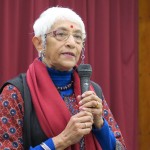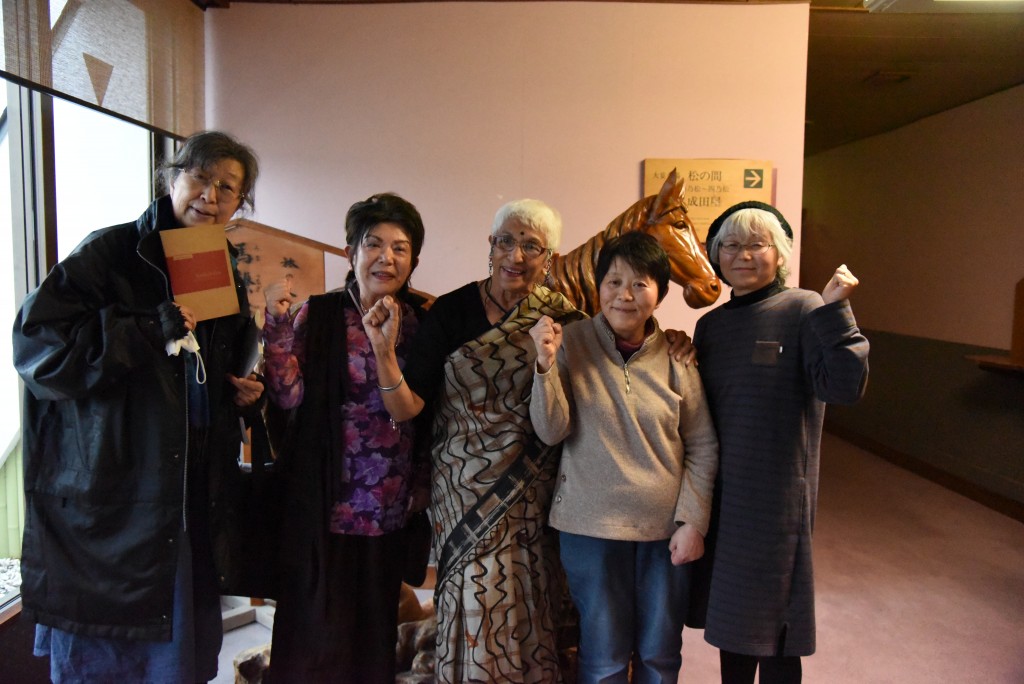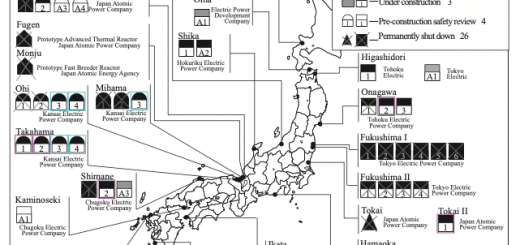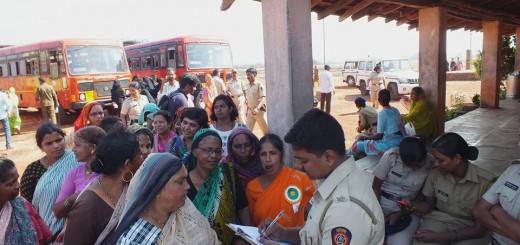Interview with Lalita Ramdas, Indian environmental activist (NIT No. 172)
 Lalita Ramdas, a former board chair of Greenpeace International and a founder of Greenpeace India, is also a senior member of the Coalition for Nuclear Disarmament and Peace (CNDP), an umbrella organization opposing both India’s nuclear weapons and its nuclear power program. She was recently in Japan to attend the No Nukes Asia Forum as well as a number of other important events and meetings. She spoke with CNIC about her Japan trip as well as the necessity for closer communication and organization around nuclear issues between regions and countries.
Lalita Ramdas, a former board chair of Greenpeace International and a founder of Greenpeace India, is also a senior member of the Coalition for Nuclear Disarmament and Peace (CNDP), an umbrella organization opposing both India’s nuclear weapons and its nuclear power program. She was recently in Japan to attend the No Nukes Asia Forum as well as a number of other important events and meetings. She spoke with CNIC about her Japan trip as well as the necessity for closer communication and organization around nuclear issues between regions and countries.
I’d read so much about Fukushima over the last five years but actually coming here and seeing it with my own eyes and speaking with so many people about what has happened to them and seeing the actions that people are taking has been a very meaningful experience. I am particularly grateful that we were able to spend two days meeting with local affected people and hearing their personal stories. It was also important for me to gain some sense of the history of Fukushima, that it was always cast in the role of supplying energy for the big cities, firstly in the form of coal. But when the coal mines were closed, people needed jobs and nuclear power was sold to Fukushima in the same way it is sold all over the world– as energy for a bright future that would provide jobs and prosperity for otherwise struggling and impoverished villages. And of course there was the solemn promise, which everyone believed, that they would be completely safe. The magnitude of this broken promise was the beginning of a huge wave of distrust. The lies that followed the meltdowns only increased the feeling of betrayal and it was very obvious that all those we spoke to did not believe a word of the official information. The efforts that have been made by ordinary citizens to understand complex technical issues and to get their own information and apply it to their own circumstances is truly impressive. The state-of-the-art radiation testing site in Iwaki which we visited, stands as testimony to how much citizens can achieve with their own strength and determination.
The fact that the movement in Japan has extended into mainstream society is obviously a major achievement. No Nukes Day, the demonstration we attended in Shibuya, Tokyo, felt like a festival, with a fun atmosphere where anyone could join in. But on the other hand, I also felt that there were divisions between activists and some of the citizens we met in Fukushima. Everyone is active in their own way, but I couldn’t help thinking that more coordination between people would lead to more effective actions. Also, there seemed to be a lack of interest or curiosity about what is happening in other countries. No one who we spoke to in Fukushima really asked us about what was happening in India. I think it’s important to realize that Fukushima and Japan are not alone in facing nuclear power and radiation issues. This danger affects the whole of humanity and indeed all life on the planet and we really must work together and share our experiences and knowledge if we are to achieve meaningful change.
We were also able to attend some sessions of the World Social Forum on Nuclear Issues at the YMCA in Tokyo which were very interesting. The session on workers in nuclear plants made me realize how much work we need to do on this in India. Even in France and Korea, contract workers in nuclear plants are not given proper medical examinations or insurance, they work under terrible conditions and are highly exploited. I am concerned that the situation in India may be even worse, but we have very little direct contact with plant workers and we need to talk to the trade unions and others to see how we can involve these workers.
After the nuclear tests conducted by India and Pakistan in 1998, we organized the South Asia Yatra, a kind of pilgrimage, through India and Pakistan to protest the nuclearization of the two countries. There was a lot of international support for this action from various organizations, but since then we have tended to become more insular, finding that the best we can do is deal with our own numerous problems. That’s why these kinds of events which bring together people from different movements and countries are so important. We really need to be sharing experiences and information on a regular basis. There needs to be better regional structures in place which enable us to coordinate our actions, combine our strengths. Even utilizing the internet better would be a start, but to do this properly, we need to actually employ someone, even on a part time basis who can take responsibility for the day to day running of an Asian anti-nuclear coalition. Also, I felt a kind of lack of young people at many of the events I attended. There were a few at the demonstration, but we really need the youth of Asia to come together and be a major part of any coalition that we create. It is their energy which will carry it forward.
I am very glad that we were given the opportunity to meet with people from the Ministry of Foreign Affairs and the Ministry of Economy, Trade and Industry and discuss the export of nuclear technology to India and Turkey. Of course bureaucrats are representatives of the government and we can’t expect them to do anything except tow the government line. Thus, to our question about why Japan was considering exporting nuclear technology when the Fukushima nuclear disaster was still ongoing and Japan especially is so aware of the risks, the response was that Japan was simply responding to requests from the governments of India and Turkey. Both have plans to expand their nuclear power generation, and if they don’t get this technology from Japan, they will get it from somewhere else, so Japan is offering these governments what they want. Moreover, according to the bureaucrats, Japanese technology has made improvements after learning the lessons of Fukushima, so the technology to be exported will also have benefited from this experience, thus increasing safety. To this, one of our Japanese colleagues replied that surely the lesson of Fukushima is that nuclear power generation is never completely safe, that safety was a myth which we should never again believe and we should certainly not try to make other countries believe it just to increase profits for Japanese corporations.
Of course the nuclear cooperation agreements are signed between governments, but I believe that it is still important that bureaucrats, who are negotiating and implementing these agreements, understand what the people, rather than the governments, think of all their hard work. Apparently the Ministry of Foreign Affairs was under the impression that the people of Sinop, the site in Turkey selected for a Japanese nuclear power plant, were largely in favor of receiving the plant. Our colleagues from Turkey corrected them on this very mistaken belief. We also told them of the strong opposition to nuclear power by grass root groups in India, as well as the brutal repression these people were suffering at the hands of the government. They shrugged off all responsibility for this, saying it was an internal issue of the Indian government in which they could not interfere.
Photos by Ryohei Kataoka, CNIC)



